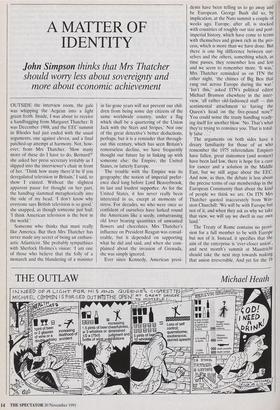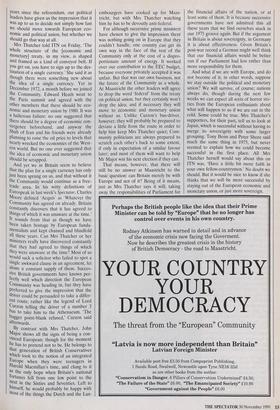A MATTER OF IDENTITY
John Simpson thinks that Mrs Thatcher
should worry less about sovereignty and more about economic achievement
OUTSIDE the interview room, the gale was whipping the Aegean into a light green froth. Inside, I was about to receive a handbagging from Margaret Thatcher. It was December 1988, and the EEC summit in Rhodes had just ended with the usual arguments, one against eleven, and a final patched-up attempt at harmony. Not, how- ever, from Mrs Thatcher. 'How many more of these do I have to do, Bernard?' she asked her press secretary irritably as I slipped into the interviewer's chair in front of her. 'Think how many there'd be if you deregulated television in Britain,' I said, to show I existed. Without the slightest apparent pause for thought on her part, the handbag slammed metaphorically into the side of my head. 'I don't know why everyone says British television is so good,' she snapped, as though someone just had; 'I think American television is the best in the world.'
Someone who thinks that must really like America. But then Mrs Thatcher has never made any secret of being an enthusi- astic Atlanticist. She probably sympathises with Sherlock Holmes's vision: 'I am one of those who believe that the folly of a monarch and the blundering of a minister in far-gone years will not prevent our chil- dren from being some day citizens of the same worldwide country, under a flag which shall be a quartering of the Union Jack with the Stars and Stripes.' Not one of the great detective's better deductions, perhaps, but it is a reminder that through- out this century, which has seen Britain's remorseless decline, we have frequently thought our future lay in linking up with someone else: the Empire, the United States, or latterly Europe.
The trouble with the Empire was its geography; the notion of imperial prefer- ence died long before Lord Beaverbrook, its last and loudest supporter. As for the United States, it has never really been interested in us, except at moments of stress. For decades, we who were once so confident of ourselves have lurked round the Americans like a seedy, embarrassing old lover bearing quantities of unwanted flowers and chocolates. Mrs Thatcher's influence on President Reagan was consid- erable, but it depended on supporting what he did and said, and when she com- plained about the invasion of Grenada, she was simply ignored.
Ever since Kennedy, American presi- dents have been telling us to go away and be European. George Bush did so, by implication, at the Nato summit a couple of weeks ago. Europe, after all, is stocked with countries of roughly our size and post- imperial history, which have come to terms with themselves and grown rich in the pro- cess, which is more than we have done. But there is one big difference between our- selves and the others, something which, as time passes, they remember less and less and we seem to remember more. 'It was,' Mrs Thatcher reminded us on ITN the other night, 'the chimes of Big Ben that rang out across Europe during the war.' 'Isn't this,' asked ITN's political editor Michael Brunson elsewhere in the inter- view, 'all rather old-fashioned stuff — this sentimental attachment to having the Queen's head on the five-pound note?' You could sense the trusty handbag ready- ing itself for another blow. 'No. That's what they're trying to convince you. That is total- ly false ...'
The arguments on both sides have a dreary familiarity for those of us who remember the 1975 referendum. Empires have fallen, great statesmen (and women) have been laid low, there is hope for a cure for cancer and a solution in the Middle East, but we still argue about the EEC. And now, as then, the debate is less about the precise terms of our membership in the European Community than about the kind of people we think we are. On ITN Mrs Thatcher quoted inaccurately from Win- ston Churchill: 'We will be with Europe but not of it, and when they ask us why we take that view, we will say we dwell in our own land.'
The Treaty of Rome contains no provi- sion for a full member to be with Europe but not of it. Instead, it specifies that the aim of the enterprise is 'ever-closer union', and next month's summit at Maastricht should take the next step towards making that union irreversible. And yet for the 16
years since the referendum, our political leaders have given us the impression that it was up to us to decide not simply how fast we should move towards European eco- nomic and political union, but whether we should go that way at all. Mrs Thatcher told ITN on Friday, 'The whole structure of the [economic and monetary] treaty, in my view, is shaped and framed as a kind of conveyor belt. If You get on, you have to sign up to the des- tination of a single currency.' She said it as though there were something new about the idea of a single currency. Yet in December 1972, a month before we joined the Community, Edward Heath went to the Paris summit and agreed with the other members that there should be eco- nomic and monetary union by 1980. It was a ludicrous failure: no one suggested that there should be a degree of economic con- vergence beforehand, and anyway the Shah of Iran and his friends were already planning to raise the oil price to levels that nearly wrecked the economies of the West- ern world. But no one ever suggested that the idea of economic and monetary union should be scrapped.
And yet we in Britain seem to believe that the plan for a single currency has only Just been sprung on us, and that without it the Community would continue as a free- trade area. In his witty definitions of Eurospeak in last week's Spectator, Charles Moore defined 'Acquis' as 'Whatever the Community has agreed on already. Britain constantly discovers that it has agreed to things of which it was unaware at the time.' It sounds from that as though we have been taken hostage by European funda- mentalists and kept chained and blindfold all these years. Can Mrs Thatcher or her ministers really have discovered constantly that they had agreed to things of which they were unaware at the time? Most of us Would sack a solicitor who failed to spot a single awkward clause in an agreement, let alone a constant supply of them. Succes- sive British governments have known per- fectly well which direction the European Community was heading in, but they have preferred to give the impression that the driver could be persuaded to take a differ- ent route; rather like the legend of Lord Curzon telling the driver of a number 3 bus to take him to the Athenaeum. 'The hugger point-blank refused,' Curzon said afterwards.
By contrast with Mrs Thatcher, John Major shows all the signs of being a con- vinced European; though for the moment he has to pretend not to be. He belongs to that generation of British Conservatives which took to the notion of an integrated Europe when they were teenagers in Harold Macmillan's time, and clung to it as the only hope when Britain's national fortunes fell from one low point to the next in the Sixties and Seventies. Left to himself, he would probably be happy with most of the things the Dutch and the Lux-
embourgers have cooked up for Maas- tricht, but with Mrs Thatcher watching him he has to be devoutly anti-federal.
For although successive prime ministers have chosen to give the impression there was nothing going on in Europe that they couldn't handle, one country can get its own way in the face of the rest of the Community only at the cost of a dispro- portionate amount of energy. It worked over our contribution to the EEC budget, because everyone privately accepted it was unfair. But that was our own business, not the future of the Community as a whole. At Maastricht the other leaders will agree to drop the word 'federal' from the treaty on political union. but they certainly won't drop the idea; and if necessary they will move to economic and monetary union without us. Unlike Curzon's bus-driver, however, they will probably be prepared to deviate a little from the route in order to help him keep Mrs Thatcher quiet; Com- munity politicians are always prepared to scratch each other's back to some extent, if only in expectation of a similar favour later; and most of them will want to help Mr Major win his next election if they can.
That means, however, that there will still be no answer at Maastricht to the basic question: can Britain merely be with Europe and not of it? Being of it means, just as Mrs Thatcher says it will, taking away the responsibilities of Parliament for
the financial affairs of the nation, or at least some of them. It is because successive governments have not admitted this all these years that we find ourselves stuck in our 1975 groove again. But if the argument in Britain is about sovereignty, in Germany it is about effectiveness. Given Britain's post-war record a German might well think that our financial affairs would be better run if our Parliament had less rather than more responsibility for them.
And what if we are with Europe, and do not become of it; in other words, suppose we stay outside the political and monetary union? We will survive, of course; nations always do, though during the next few weeks we can expect all sorts of horror sto- ries from the European enthusiasts about what will happen to us if we are out in the cold. Some could be true. Mrs Thatcher's supporters, for their part, tell us to look at Japan, which is successful without having to merge its sovereignty with some larger grouping. Tony Benn and Peter Shore said much the same thing in 1975, but never seemed to explain how we could become successful in the first place. All Mrs Thatcher herself would say about this on ITN was, 'Have a little bit more faith in your own fellow-countrymen.' No doubt we should. But it would be nice to know if she thinks that we will be more successful by staying out of the European economic and monetary union, or just more sovereign.











































































 Previous page
Previous page